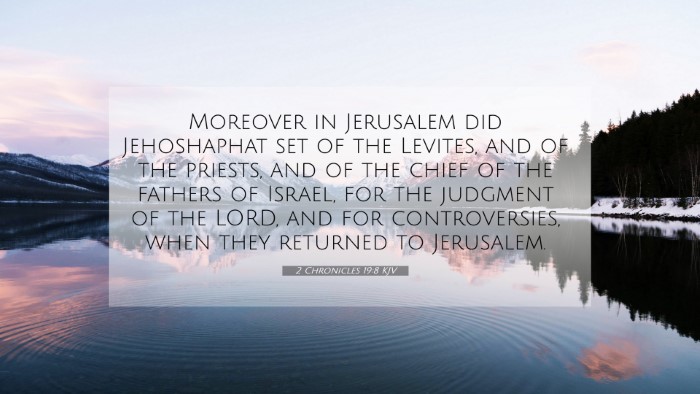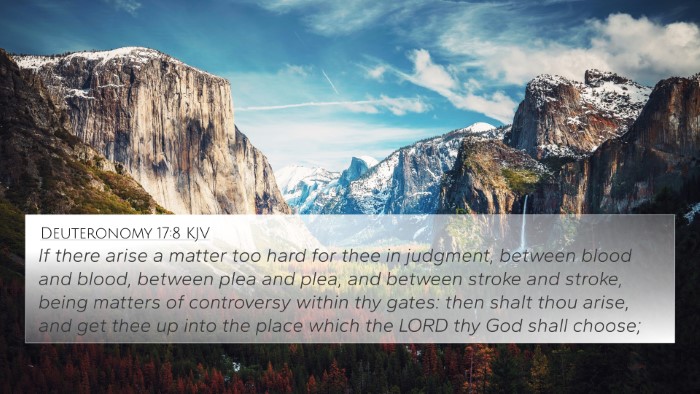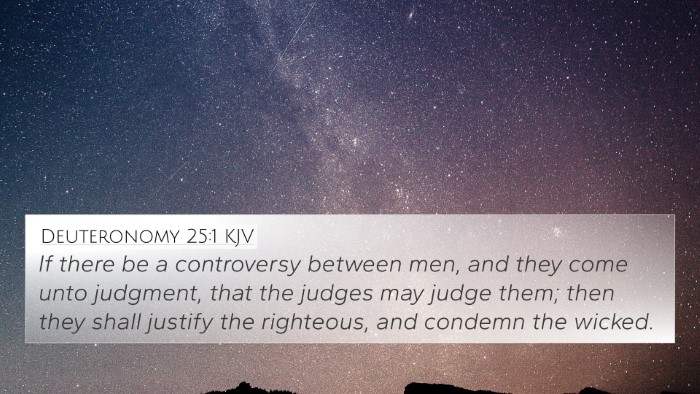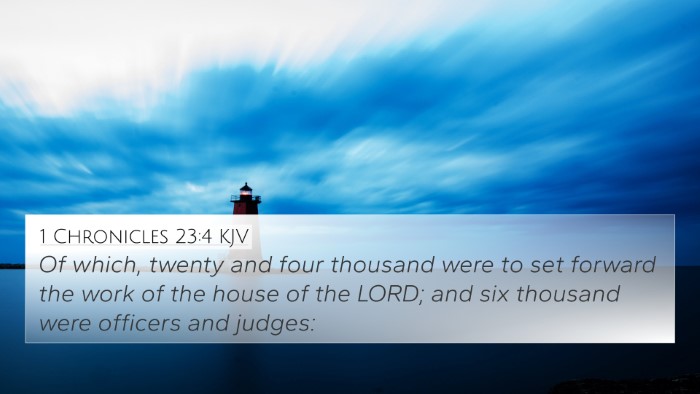Understanding 2 Chronicles 19:8
2 Chronicles 19:8 states: "Moreover, in Jerusalem did Jehoshaphat set of the Levites and of the priests and of the chief of the fathers of Israel, for the judgment of the Lord, and for controversies, when they returned to Jerusalem."
Summary of the Verse
This verse highlights King Jehoshaphat's reforms in Judah, specifically in relation to the administration of justice and the importance of involving Levites and priests in governance. The king sought to establish a system grounded in divine judgment, which indicated a return to faithfulness to God's law.
Biblical Context
In the context of 2 Chronicles, Jehoshaphat is known for his attempt to lead Judah back to God following compromises made in his alliance with Israel. This verse showcases his dedication to justice, ensuring that the leaders who would rule would do so with a heart aligned to God's will.
Commentary Insights
Various public domain commentaries provide rich insights into this verse:
-
Matthew Henry:
Henry emphasizes that Jehoshaphat's actions were designed to prevent corruption in judicial matters. By appointing Levites and priests, he sought to ensure that decisions were made with righteousness and fidelity to God's laws.
-
Albert Barnes:
Barnes conveys that the choice of priests and Levites reflects a commitment to spiritual authority in civil matters, showcasing the intertwining of spiritual leadership with temporal governance. This stems from a desire for divine approval in judgments.
-
Adam Clarke:
Clarke adds that this establishment of a religious court was significant to maintain a society centered on God's directives, emphasizing that the instructions for legal decisions were not merely human but divinely guided.
Cross-Referencing Biblical Texts
This verse can be cross-referenced with various key scriptures to deepen understanding:
- Deuteronomy 17:9 - This verse instructs on seeking the priest's judgment in matters of controversy.
- 2 Chronicles 19:10 - Further instructions about the roles of Levites and priests in delivering justice.
- Exodus 18:21-22 - Jethro's advice to Moses about appointing leaders over thousands, hundreds, fifties, and tens who fear God.
- Isaiah 1:17 - Call to seek justice and encourage the oppressed, resonating with the motive behind Jehoshaphat's reforms.
- 1 Samuel 12:3 - Samuel presents himself as a trustworthy judge, demonstrating the ideal that leaders should be accountable for their actions.
- Psalms 82:3 - A divine command to defend the weak and uphold justice, which aligns with Jehoshaphat's reforms.
- James 1:27 - The call for pure religion involves caring for orphans and widows, echoing themes of justice throughout the scriptures.
Thematic Connections
Understanding this verse in connection with others provides insights into biblical themes such as justice, godly leadership, and divine law.
Jehoshaphat's example encourages believers to seek God's guidance in governance and judgment:
- Justice and Righteousness: Central themes throughout scripture, emphasizing that leaders must execute justice as representatives of God.
- Human Accountability: The emphasis on priestly and Levite roles signifies the importance of accountability in leadership, reflecting God's nature in judgments made over people.
- Spiritual Authority: Connection with the concept that all authority should align with God's will, maintaining a structure rooted in divine principles.
Conclusion
2 Chronicles 19:8 serves as a profound reminder of the significance of seeking divine guidance and justice in leadership. It calls for modern believers to understand the connections between various Bible verses that advocate for righteousness and godly governance. By cross-referencing with other biblical texts, one can see a consistent theme of God's sovereignty and righteousness throughout scripture.
Future Study and Reflection
As you contemplate this verse, consider how it relates to your understanding of leadership and justice in today's context. Reflect on how cross-referencing biblical passages can enhance your spiritual journey and bring clarity to your faith.









